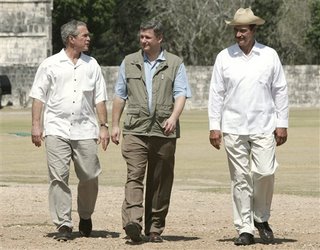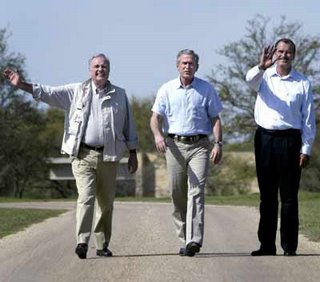The
Canadian Charter of Rights and Freedoms enshrines fundamental individual rights, like freedom of religion and freedom of expression, as the law of the land, but not before hedging its bets. According to
Section 1,
The Canadian Charter of Rights and Freedoms guarantees the rights and freedoms set out in it subject only to such reasonable limits prescribed by law as can be demonstrably justified in a free and democratic society.
The question that follows is an obvious one. What exactly are the 'reasonable' limits?
The Supreme Court most recently dealt with this question in the
Multani case, where it ruled that Orthodox Sikhs should be allowed to carry ceremonial daggers (kirpans) with them to school, in accordance with their religious beliefs. This overturned an earlier decision by the Quebec Court of Appeal which ruled that schools should be allowed to ban kirpans just as other "weapons and dangerous objects" are banned. The unanimous Supreme Court decision argued that banning kirpans at school would be a violation Section 2a of the Charter, which guarantees freedom of religion.
So where then is the limit of the right? If even the presence of daggers in schools can be justified by religious belief, does that imply that freedom of religion always trumps public safety concerns? Lest you draw the wrong conclusion, the
Supreme Court's decision explains some of its reasoning.
The risk of G using his kirpan for violent purposes or of another student taking it away from him is very low, especially if the kirpan is worn under conditions such as were imposed by the Superior Court. It should be added that G has never claimed a right to wear his kirpan to school without restrictions. Furthermore, there are many objects in schools that could be used to commit violent acts and that are much more easily obtained by students, such as scissors, pencils and baseball bats. The evidence also reveals that not a single violent incident related to the presence of kirpans in schools has been reported. Although it is not necessary to wait for harm to be done before acting, the existence of concerns relating to safety must be unequivocally established for the infringement of a constitutional right to be justified.
Even now, the kirpan does not roam completely free. In the aftermath of the September 11th terrorist attacks in America, Transport Canada banned all "knives or knife-like objects" - including kirpans - from airplanes. If the question before the Supreme Court had been one of kirpans on airplanes instead of kirpans in schools, one could surmise how it would rule. In the case of aircraft, not only are weapons prohibited and thoroughly searched for, but even scissors have been confiscated during security checks, so it could not be argued that objects with potential use in a violent attack are easily obtainable. Moreover, the use of boxcutters by the 9/11 hijackers established unequivocally the danger of allowing any manner of sharp object onboard. Clearly, allowing kirpans on airplanes lies beyond the 'reasonable limit' of religious freedom.
But the debate over reasonable limits has been more prominent of late over the issue of freedom of expression. Murderous mobs have been marauding in the wake of the publication in Denmark's Jyllands-Posten of
cartoons depicting the Muslim prophet Mohammed - no doubt egged on by some egregious
forgeries. But the question being asked by cooler heads is whether or not Jyllands-Posten (and others that reprinted the cartoons afterwards) overstepped the bounds of free speech by publishing the cartoons.
Of the 12 cartoons, some indeed are offensive, like the one showing Mohammed wearing a turban with a bomb in it. Many of the others are completely innocuous to any non-Muslim observer - simple illustrations of Mohammed with no demeaning subtext. Yet even the latter type of cartoons have been at issue because they contravene the Muslim law preventing any depiction of Mohammed whatsoever, innocuous or otherwise.
Section 27 of the Charter instructs
This Charter shall be interpreted in a manner consistent with the preservation and enhancement of the multicultural heritage of Canadians.
Indeed, in its ruling on kirpans in schools, the Supreme Court also mentioned religious tolerance and multiculturalism as Canadian values that weighed into its decision. One might then argue that the limit to freedom of expression can be found at the point where it offends religious sensitivities, just as the Supreme Court argued that prohibiting kirpans "...is also disrespectful to believers in the Sikh religion and does not take into account Canadian values based on multiculturalism."
But there is a difference. A individual Sikh student carrying around a kirpan in school exercises his right to religious freedom at no one else's expense. The court was convinced that the kirpan did not constitute a particular threat (under certain imposed conditions) to the other students' right to live in security. On the other hand, the claim that muslims as a collective body have the right not to be offended by depictions of their prophet contravenes every non-muslim individual's right to both freedom of speech and freedom of religion (that is, the freedom not to follow sharia law).
The bounds of freedom of expression cannot be defined in terms of collective rights of other groups, but rather the rights of other individuals. Newspapers should only censor themselves in regards to things like libel or hate speech, which puts the rights of members of the slandered minorities at risk by inciting discrimination.
While multiculturalism is one of the most important facets of our society, we should not forget that the framework of that society is built upon the rights of the individual. It is not a common definition of blasphemy that protects our multicultural heritage. Instead, it is a recognition that each individual has the right to live according to his or her beliefs - as long as it does not impede other individuals' rights to do the same. It appears then that the reasonable limit lies at the edge of your neighbour's lawn.









